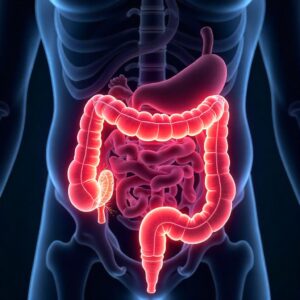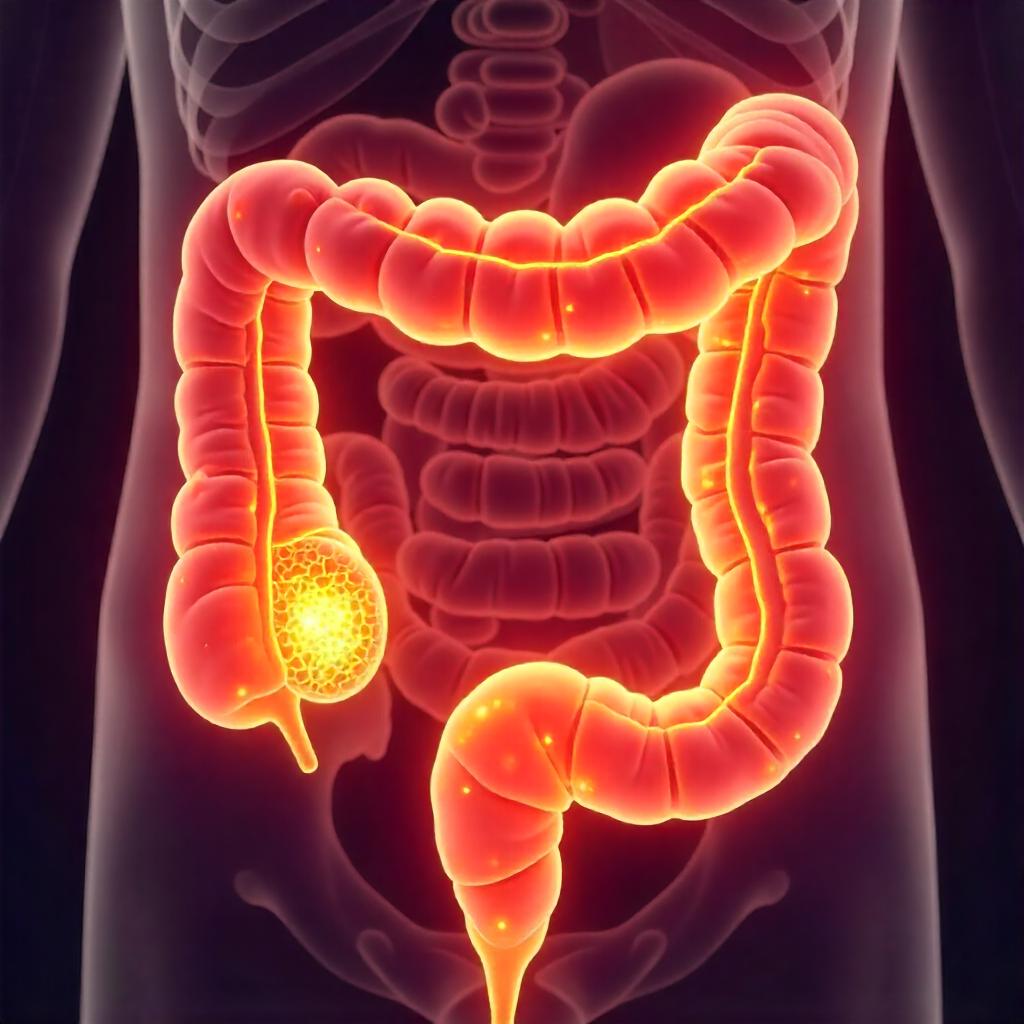Introduction
Ulcerative colitis (UC) is a chronic inflammatory bowel disease (IBD) that primarily affects the colon and rectum. Characterized by inflammation and ulcers in the lining of the gastrointestinal tract, ulcerative colitis can significantly impact an individual’s quality of life. The exact cause of UC remains unknown, but it is believed to involve a combination of genetic, environmental, and immune factors.

In this comprehensive article, we will explore ulcerative colitis in detail, covering its symptoms, causes, diagnosis, treatment options, dietary considerations, and the psychological impact of living with this condition. By the end of this article, readers will have a thorough understanding of ulcerative colitis, its management, and the importance of support for those affected.
1. What is Ulcerative Colitis?
1.1 Definition
Ulcerative colitis is a type of inflammatory bowel disease (IBD) that causes chronic inflammation of the colon’s inner lining. The inflammation often leads to the formation of ulcers, which can result in symptoms such as abdominal pain, diarrhea, and rectal bleeding. Unlike Crohn’s disease, another form of IBD, ulcerative colitis is limited to the colon and rectum and does not affect the entire gastrointestinal tract.
1.2 Types of Ulcerative Colitis
Ulcerative colitis can be classified into several types based on the location and extent of the inflammation:
- Ulcerative Proctitis: Inflammation is limited to the rectum. Patients may experience rectal bleeding and urgency but may not have other symptoms of colitis.
- Proctosigmoiditis: Involves the rectum and the sigmoid colon (the lower part of the colon). Symptoms may include diarrhea mixed with blood and abdominal cramps.
- Left-Sided Colitis: Affects the left side of the colon, including the descending colon. Symptoms may include abdominal pain on the left side, diarrhea, and weight loss.
- Pancolitis: Involves the entire colon. This is the most severe form of ulcerative colitis and can lead to more significant complications.
- Acute Severe Ulcerative Colitis: A severe form that can lead to significant complications, including toxic megacolon and perforation of the colon. This condition requires immediate medical attention.
1.3 Epidemiology
Ulcerative colitis affects millions of people worldwide, with varying prevalence across different regions. It is most commonly diagnosed in individuals between the ages of 15 and 30, but it can occur at any age. The condition is more prevalent in developed countries, particularly in North America and Europe, and tends to run in families, indicating a genetic predisposition.

2. Symptoms of Ulcerative Colitis
2.1 Common Symptoms
Symptoms of ulcerative colitis can vary in severity and may include:
- Diarrhea: Frequent, loose stools, often accompanied by blood or mucus. The urgency and frequency can be debilitating.
- Abdominal Pain: Cramping or pain in the abdomen, which may be relieved after a bowel movement.
- Rectal Bleeding: Blood in the stool or on toilet paper. This symptom can be alarming and may lead to anxiety about the condition.
- Urgency to Defecate: A sudden, strong urge to have a bowel movement, which can lead to accidents if not addressed quickly.
- Fatigue: A general feeling of tiredness or lack of energy, often due to anemia or the body’s ongoing inflammatory response.
- Weight Loss: Unintentional weight loss due to reduced appetite or malabsorption of nutrients.
- Fever: Low-grade fever may occur during flare-ups, indicating inflammation in the body.
2.2 Extraintestinal Symptoms
In addition to gastrointestinal symptoms, ulcerative colitis may cause extraintestinal manifestations, which can affect various organ systems:
- Joint Pain: Arthritis or joint pain may occur in some individuals, affecting mobility and quality of life.
- Skin Issues: Rashes or sores on the skin, such as erythema nodosum or pyoderma gangrenosum, can develop as a result of systemic inflammation.
- Eye Inflammation: Conditions such as uveitis or episcleritis can lead to redness, pain, and vision problems.
- Liver Disorders: Conditions like primary sclerosing cholangitis, which affects the bile ducts, may occur alongside ulcerative colitis, increasing the risk of liver complications.

3. Causes of Ulcerative Colitis
3.1 Genetic Factors
While the exact cause of ulcerative colitis is unknown, genetics play a significant role in its development. Research has shown that individuals with a family history of IBD are at a higher risk of developing the condition. Specific genetic mutations have been associated with an increased susceptibility to ulcerative colitis, although the presence of these genes alone does not guarantee the disease will develop.
3.2 Immune System Dysfunction
Ulcerative colitis is thought to be an autoimmune disorder, where the immune system mistakenly attacks the lining of the colon. This immune response can lead to inflammation and damage to the intestinal tissue. In patients with UC, the immune system may overreact to normal gut bacteria, leading to chronic inflammation and ulceration.
3.3 Environmental Triggers
Certain environmental factors may contribute to the onset or exacerbation of ulcerative colitis. These may include:
- Diet: High-fat diets, processed foods, and low fiber intake may influence the risk of developing UC. While diet alone does not cause the disease, it can affect symptom management.
- Infections: Previous infections in the gastrointestinal tract may trigger an abnormal immune response, leading to the development of ulcerative colitis.
- Medications: Some medications, such as nonsteroidal anti-inflammatory drugs (NSAIDs), may exacerbate symptoms or trigger flare-ups in susceptible individuals.
- Smoking: Interestingly, smoking has been found to have a protective effect against ulcerative colitis, though it is not recommended as a treatment option due to associated health risks.
3.4 Stress
While stress does not cause ulcerative colitis, it can trigger flare-ups or worsen symptoms. Managing stress through relaxation techniques, exercise, and adequate sleep is essential for individuals with UC. Psychological stress can exacerbate inflammation and impact overall health, making stress management a crucial component of living with the condition.
4. Diagnosis of Ulcerative Colitis
4.1 Medical History and Physical Examination
The diagnosis of ulcerative colitis begins with a thorough medical history and physical examination. Physicians will inquire about symptoms, family history, and any previous gastrointestinal issues. A physical exam may reveal signs of anemia, abdominal tenderness, or other complications.
4.2 Diagnostic Tests
Several tests may be conducted to confirm the diagnosis of ulcerative colitis:
- Blood Tests: To check for anemia, inflammation, and infection. Elevated white blood cell counts or inflammatory markers may indicate active disease.
- Stool Tests: To rule out infections and assess for blood in the stool. Stool tests can also check for inflammatory markers like calprotectin.
- Colonoscopy: A procedure that allows doctors to visualize the colon and rectum, taking biopsies to confirm inflammation and ulcers. Colonoscopy is the gold standard for diagnosing ulcerative colitis and assessing the extent of the disease.
- Imaging Studies: CT scans or MRIs may be used to assess the extent of the disease and rule out other conditions. These imaging studies can provide additional information about the colon’s structure and any complications.

4.3 Differential Diagnosis
It is important to differentiate ulcerative colitis from other gastrointestinal disorders, such as Crohn’s disease, irritable bowel syndrome (IBS), and colorectal cancer. A thorough evaluation and diagnostic testing are crucial for accurate diagnosis. Misdiagnosis can lead to inappropriate treatment and worsening of symptoms.
5. Treatment Options for Ulcerative Colitis
5.1 Medications
The treatment of ulcerative colitis typically involves medications aimed at reducing inflammation, managing symptoms, and achieving remission. Common classes of medications include:
- Aminosalicylates: These anti-inflammatory drugs, such as mesalamine, are often used to treat mild to moderate UC. They work by targeting inflammation in the colon and are effective for maintaining remission.
- Corticosteroids: These medications help reduce inflammation during flare-ups but are not recommended for long-term use due to side effects. Steroids like prednisone are often used for short-term management of acute symptoms.
- Immunomodulators: These drugs suppress the immune response and may be used for patients who do not respond to other treatments. Examples include azathioprine and mercaptopurine.
- Biologics: Targeted therapies that block specific pathways in the inflammatory process. Examples include infliximab and adalimumab. Biologics are often used for moderate to severe cases of ulcerative colitis that have not responded to traditional therapies.
- JAK Inhibitors: Newer oral medications, such as tofacitinib, work by inhibiting specific pathways involved in the inflammatory response and are used for moderate to severe UC.
5.2 Nutritional Support
Dietary modifications can play a crucial role in managing ulcerative colitis. While there is no specific “UC diet,” individuals may benefit from:
- Identifying Trigger Foods: Keeping a food diary to identify and avoid foods that worsen symptoms. Common triggers may include dairy, gluten, and high-fiber foods during flare-ups.
- Increased Fiber Intake: Gradually increasing fiber can help regulate bowel movements, but some individuals may need to limit fiber during flare-ups.
- Hydration: Staying well-hydrated is essential, especially during episodes of diarrhea. Electrolyte solutions may be beneficial during severe diarrhea.
- Nutritional Supplements: Individuals with UC may require supplements to address deficiencies, particularly if they experience malabsorption. Iron, vitamin B12, and vitamin D supplements are commonly recommended.
5.3 Surgery
In severe cases of ulcerative colitis that do not respond to medical treatment, surgery may be necessary. Surgical options include:
- Colectomy: Removal of the entire colon, which can cure ulcerative colitis but requires the creation of an ileostomy or internal pouch. In some cases, a two-step procedure may be performed to allow for recovery.
- Ileal Pouch-Anal Anastomosis (IPAA): A procedure in which a pouch is created from the small intestine and connected to the anus, allowing for more normal bowel function. This procedure can improve quality of life for those with severe UC.

5.4 Complementary Therapies
Some individuals with ulcerative colitis may explore complementary therapies, such as acupuncture, yoga, and mindfulness-based stress reduction, to help manage symptoms and improve overall well-being. It is essential to discuss these options with a healthcare provider before starting any new treatment.
6. Living with Ulcerative Colitis
6.1 Managing Flare-Ups
Living with ulcerative colitis involves managing flare-ups effectively. Strategies include:
- Recognizing Triggers: Identifying and avoiding foods, stressors, or situations that may lead to flare-ups. Keeping a symptom diary can help identify patterns.
- Adhering to Medication: Consistently taking prescribed medications and discussing any changes in symptoms with a healthcare provider.
- Maintaining a Healthy Lifestyle: Regular exercise, a balanced diet, and stress management techniques can contribute to overall wellness. Engaging in physical activity can help reduce stress and improve mood.
6.2 Psychological Impact
Ulcerative colitis can take a toll on mental health, leading to anxiety, depression, and social isolation. It is essential to address the psychological aspects of living with UC by:
- Seeking Support: Joining support groups or connecting with others who share similar experiences can provide valuable emotional support. Online forums and local support groups can be helpful resources.
- Therapy: Talking to a mental health professional can help individuals cope with the emotional challenges of living with a chronic illness. Cognitive-behavioral therapy (CBT) can be particularly effective in addressing anxiety and depression.
6.3 Importance of Regular Check-Ups
Regular check-ups with a healthcare provider are crucial for monitoring the condition, adjusting treatment plans, and addressing any complications. Routine screenings for colorectal cancer are also important for individuals with a long history of ulcerative colitis. Early detection and intervention can lead to better outcomes.
7. Dietary Considerations for Ulcerative Colitis
7.1 Foods to Eat
While dietary needs may vary among individuals with ulcerative colitis, some foods may be beneficial during remission:
- Lean Proteins: Skinless poultry, fish, tofu, and eggs are good protein sources that are generally well-tolerated.
- Low-Fiber Fruits and Vegetables: Bananas, applesauce, cooked carrots, and zucchini can be easier to digest. Cooking vegetables can help break down fiber and make them more palatable.
- Healthy Fats: Avocado, olive oil, and nut butters provide healthy fats without exacerbating symptoms. Omega-3 fatty acids from fish may also have anti-inflammatory properties.
- Probiotics: Yogurt and fermented foods may help promote gut health. Probiotic supplements can also be beneficial in restoring the gut microbiome.
7.2 Foods to Avoid
Certain foods may trigger symptoms or exacerbate flare-ups. Individuals with ulcerative colitis may want to limit or avoid:
- High-Fiber Foods: Raw fruits and vegetables, whole grains, and legumes may be difficult to digest during flare-ups. Some individuals may find that low-fiber diets help ease symptoms.
- Spicy Foods: Spices and hot sauces can irritate the digestive tract and may lead to discomfort.
- Caffeine and Alcohol: Both can worsen diarrhea and dehydration. Limiting these substances can help manage symptoms.
- Processed Foods: Foods high in sugar, fat, and artificial additives may trigger symptoms. A diet rich in whole, unprocessed foods is generally recommended.
7.3 Meal Planning and Preparation
Meal planning can be an effective strategy for managing ulcerative colitis. Preparing meals in advance allows individuals to make healthier choices and avoid trigger foods. Here are some tips for meal planning:
- Plan Balanced Meals: Include a variety of food groups in each meal to ensure nutritional adequacy.
- Batch Cooking: Prepare larger portions of meals to have leftovers for busy days when cooking may be challenging.
- Stay Hydrated: Keep track of fluid intake and consider incorporating electrolyte-rich beverages during flare-ups.
8. Support and Resources
8.1 Support Groups
Connecting with others who have ulcerative colitis can provide emotional support and valuable information. Support groups, both in-person and online, can help individuals share their experiences, seek advice, and build a sense of community. Organizations such as the Crohn’s & Colitis Foundation offer resources and support for those affected by IBD.
8.2 Educational Resources
Staying informed about ulcerative colitis is essential for effective management. Educational resources, including books, websites, and webinars, can provide valuable information about the condition, treatment options, and coping strategies. Many reputable organizations offer materials that can help individuals and their families navigate living with UC.
8.3 Healthcare Team
Building a healthcare team that includes a gastroenterologist, dietitian, and mental health professional can enhance the management of ulcerative colitis. Collaboration among healthcare providers ensures comprehensive care that addresses both physical and emotional aspects of the condition.
Conclusion
Ulcerative colitis is a chronic condition that requires ongoing management and support. Understanding the symptoms, causes, and treatment options is essential for individuals living with UC and their families. While ulcerative colitis can significantly impact daily life, effective treatment strategies, dietary modifications, and psychological support can help individuals lead fulfilling lives.
With advancements in medical research and treatment options, individuals with ulcerative colitis can look forward to improved management of their condition. It is essential to foster open communication with healthcare providers, seek support from peers, and prioritize self-care to navigate the challenges of living with ulcerative colitis successfully.
As awareness of ulcerative colitis continues to grow, it is crucial to advocate for research, education, and resources to support those affected by this condition. By working together, we can improve the lives of individuals living with ulcerative colitis and contribute to a better understanding of this complex disease.
References
- Crohn’s & Colitis Foundation. (2021). “About Ulcerative Colitis.”
- National Institute of Diabetes and Digestive and Kidney Diseases. (2020). “Ulcerative Colitis.”
- Mayo Clinic. (2021). “Ulcerative Colitis: Symptoms and Causes.”
- American College of Gastroenterology. (2020). “Ulcerative Colitis Treatment.”
- Journal of Crohn’s and Colitis. (2021). “Management of Ulcerative Colitis: Current Perspectives.”


1 thought on “Ulcerative Colitis: Understanding the Condition”